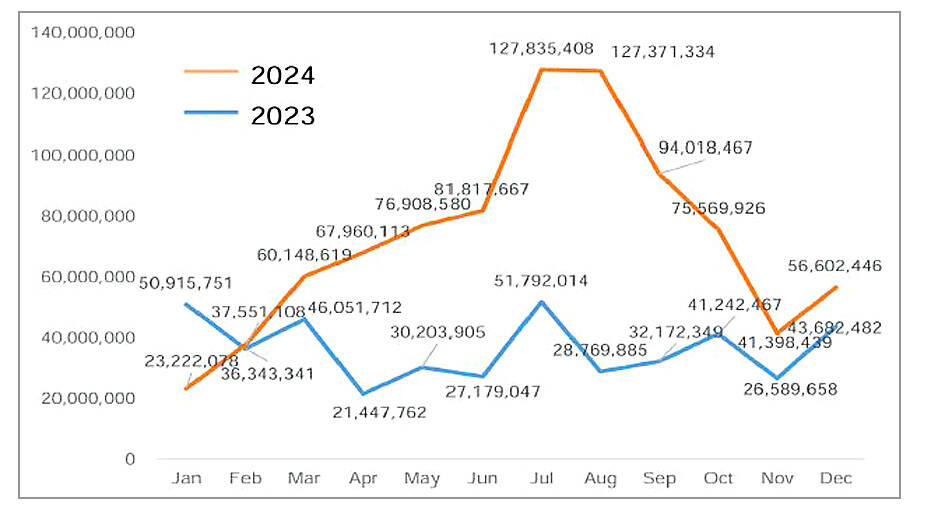Taiwan faced twice as many cyberattacks per day last year compared with the previous year, with the majority attributed to Chinese cyberforces, the National Security Bureau (NSB) said in its latest report.
The government service network registered a daily average of 2.4 million cyberattacks last year, compared with 1.2 million in 2023, according to the report titled “Analysis on China’s Cyberattack Techniques in 2024.”
While most of these attacks were effectively intercepted, the overall situation highlights the increasing severity of cyberattacks, it said.

Photo: Reuters
In the face of the continuous attacks, data theft and disruptions by Chinese cyberforces, the report helps the public understand trends and threats in cybersecurity, it said.
There were 906 cases of cyberattacks targeting the government and private sector last year, an increase of 20 percent from 2023, the agency said.
Government agencies accounted for 80 percent of these cases, it added.

Photo courtesy of the National Security Bureau
There was a 650 percent increase in attacks targeting the communications sector, 70 percent increase in the transportation sector and 57 percent increase in the defense supply chain, the report said.
These sectors have become the key focus for Chinese cyberoperations, which target vulnerabilities in government networks to steal information, the agency said.
Chinese cyberforces last year employed eight primary strategies in targeting Taiwanese entities, it said.
First, they targeted government agencies using “living off the land” techniques to avoid detection and social engineering attacks on public officials’ e-mail accounts, it said.
Second, they used various methods to infiltrate and steal information from Taiwan’s defense supply chain and information service providers, it said.
Third, they targeted critical infrastructure, such as highways and ports, aiming to disrupt the nation’s transportation systems, it said.
Techniques used to accomplish this include advanced persistent threats, phishing e-mails, zero-day vulnerabilities, Trojan viruses and backdoor programs, it added.
Fourth, they collaborated with civilian hacker organizations, employing ransomware and other cybercrime tactics to attack Taiwan’s manufacturing companies for economic benefit, it said.
Fifth, they concealed traces of cyberattacks and stole Taiwanese citizens’ personal data to sell on the dark Web, the agency said.
Simultaneously, they criticized Taiwan’s cybersecurity defenses on social media, undermining national credibility and morale, it added.
Sixth, they combined military exercises with cyberattacks, launching distributed denial-of-service attacks against Taiwan’s transportation and financial institutions to intensify disruption, it said.
Seventh, they targeted high-tech start-ups worldwide to steal patented technologies and gain a competitive advantage, it said.
Lastly, they are building a global stealth cyberattack network, exploiting password vulnerabilities to take control of Taiwan’s Internet of Things devices and make them carry out cyberattacks, it said.
China continues to escalate its cyberoffensives against Taiwan, employing diverse hacking techniques to conduct reconnaissance, plant traps, and steal data from government agencies, critical infrastructure and key private enterprises, it said.
The government leverages a joint cybersecurity defense mechanism and uses multiple intelligence sources to promptly warn responsible departments of any threats, the agency said.
The public should also prioritize cybersecurity measures and remain vigilant against Chinese cyberthreats, working together to safeguard the nation’s overall network security, it added.

PREPAREDNESS: Given the difficulty of importing ammunition during wartime, the Ministry of National Defense said it would prioritize ‘coproduction’ partnerships A newly formed unit of the Marine Corps tasked with land-based security operations has recently replaced its aging, domestically produced rifles with more advanced, US-made M4A1 rifles, a source said yesterday. The unnamed source familiar with the matter said the First Security Battalion of the Marine Corps’ Air Defense and Base Guard Group has replaced its older T65K2 rifles, which have been in service since the late 1980s, with the newly received M4A1s. The source did not say exactly when the upgrade took place or how many M4A1s were issued to the battalion. The confirmation came after Chinese-language media reported

The Taiwanese passport ranked 33rd in a global listing of passports by convenience this month, rising three places from last month’s ranking, but matching its position in January last year. The Henley Passport Index, an international ranking of passports by the number of designations its holder can travel to without a visa, showed that the Taiwan passport enables holders to travel to 139 countries and territories without a visa. Singapore’s passport was ranked the most powerful with visa-free access to 192 destinations out of 227, according to the index published on Tuesday by UK-based migration investment consultancy firm Henley and Partners. Japan’s and

A Ministry of Foreign Affairs official yesterday said that a delegation that visited China for an APEC meeting did not receive any kind of treatment that downgraded Taiwan’s sovereignty. Department of International Organizations Director-General Jonathan Sun (孫儉元) said that he and a group of ministry officials visited Shenzhen, China, to attend the APEC Informal Senior Officials’ Meeting last month. The trip went “smoothly and safely” for all Taiwanese delegates, as the Chinese side arranged the trip in accordance with long-standing practices, Sun said at the ministry’s weekly briefing. The Taiwanese group did not encounter any political suppression, he said. Sun made the remarks when

BROAD AGREEMENT: The two are nearing a trade deal to reduce Taiwan’s tariff to 15% and a commitment for TSMC to build five more fabs, a ‘New York Times’ report said Taiwan and the US have reached a broad consensus on a trade deal, the Executive Yuan’s Office of Trade Negotiations said yesterday, after a report said that Washington is set to reduce Taiwan’s tariff rate to 15 percent. The New York Times on Monday reported that the two nations are nearing a trade deal to reduce Taiwan’s tariff rate to 15 percent and commit Taiwan Semiconductor Manufacturing Co (TSMC, 台積電) to building at least five more facilities in the US. “The agreement, which has been under negotiation for months, is being legally scrubbed and could be announced this month,” the paper said,